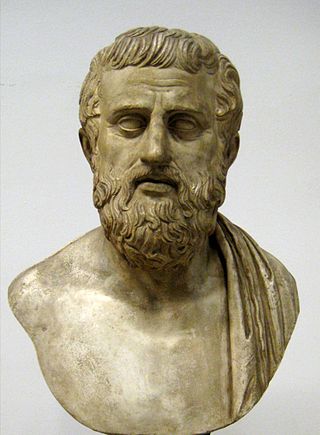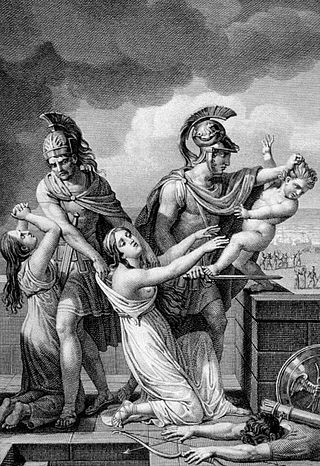Related Research Articles

Euripides was a tragedian of classical Athens. Along with Aeschylus and Sophocles, he is one of the three ancient Greek tragedians for whom any plays have survived in full. Some ancient scholars attributed ninety-five plays to him, but the Suda says it was ninety-two at most. Of these, eighteen or nineteen have survived more or less complete. There are many fragments of most of his other plays. More of his plays have survived intact than those of Aeschylus and Sophocles together, partly because his popularity grew as theirs declined—he became, in the Hellenistic Age, a cornerstone of ancient literary education, along with Homer, Demosthenes, and Menander.

Jason was an ancient Greek mythological hero and leader of the Argonauts, whose quest for the Golden Fleece featured in Greek literature. He was the son of Aeson, the rightful king of Iolcos. He was married to the sorceress Medea. He was also the great-grandson of the messenger god Hermes, through his mother's side.

Sophocles is one of three ancient Greek tragedians, at least one of whose plays has survived in full. His first plays were written later than, or contemporary with, those of Aeschylus; and earlier than, or contemporary with, those of Euripides. Sophocles wrote over 120 plays, but only seven have survived in a complete form: Ajax, Antigone, Women of Trachis, Oedipus Rex, Electra, Philoctetes and Oedipus at Colonus. For almost fifty years, Sophocles was the most celebrated playwright in the dramatic competitions of the city-state of Athens which took place during the religious festivals of the Lenaea and the Dionysia. He competed in thirty competitions, won twenty-four, and was never judged lower than second place. Aeschylus won thirteen competitions, and was sometimes defeated by Sophocles; Euripides won four.

In Greek mythology, Peleus was a hero, king of Phthia, husband of Thetis and the father of their son Achilles. This myth was already known to the hearers of Homer in the late 8th century BC.

In Greek mythology, Medea is the daughter of King Aeëtes of Colchis, a niece of Circe and the granddaughter of the sun god Helios. Medea figures in the myth of Jason and the Argonauts, appearing in Hesiod's Theogony around 700 BCE, but best known from Euripides's tragedy Medea and Apollonius of Rhodes's epic Argonautica. Medea is known in most stories as a sorceress and is often depicted as a priestess of the goddess Hecate.

Thespis was an Ancient Greek poet. He was born in the ancient city of Icarius. According to certain Ancient Greek sources and especially Aristotle, he was the first person ever to appear on stage as an actor playing a character in a play. In other sources, he is said to have introduced the first principal actor in addition to the chorus. He is often called the "Inventor of Tragedy".

In Greek mythology, Admetus was a king of Pherae in Thessaly.

Alcestis or Alceste, was a princess in Greek mythology, known for her love of her husband. Her life story was told by pseudo-Apollodorus in his Bibliotheca, and a version of her death and return from the dead was also popularized in Euripides's tragedy Alcestis.

Pelias was king of Iolcus in Greek mythology. He was the one who sent Jason on the quest for the Golden Fleece.

In Classical Greek mythology, Hippolyta, or Hippolyte was a daughter of Ares and Otrera, queen of the Amazons, and a sister of Antiope and Melanippe. She wore her father Ares' zoster, the Greek word found in the Iliad and elsewhere meaning "war belt." Some traditional English translations have preferred the more feminine-sounding "girdle." Hippolyta figures prominently in the myths of both Heracles and Theseus. The myths about her are varied enough that they may therefore be about several different women.
In Greek mythology, Pheres was the founder of Pherae in Thessaly.

The Dionysia was a large festival in ancient Athens in honor of the god Dionysus, the central events of which were the theatrical performances of dramatic tragedies and, from 487 BC, comedies. It was the second-most important festival after the Panathenaia. The Dionysia actually consisted of two related festivals, the Rural Dionysia and the City Dionysia, which took place in different parts of the year. They were also an essential part of the Dionysian Mysteries.
Medea is an ancient Greek tragedy written by Euripides, based upon the myth of Jason and Medea and first produced in 431 BC. The plot centers on the actions of Medea, a former princess of the kingdom of Colchis, and the wife of Jason; she finds her position in the Greek world threatened as Jason leaves her for a Greek princess of Corinth. Medea takes vengeance on Jason by murdering his new wife as well as her own two sons, after which she escapes to Athens to start a new life.
Greek tragedy is a form of theatre from Ancient Greece and Greek inhabited Anatolia. It reached its most significant form in Athens in the 5th century BC, the works of which are sometimes called Attic tragedy.

The Trojan Women, also translated as The Women of Troy, and also known by its transliterated Greek title Troades, is a tragedy by the Greek playwright Euripides. Produced in 415 BC during the Peloponnesian War, it is often considered a commentary on the capture of the Aegean island of Melos and the subsequent slaughter and subjugation of its populace by the Athenians earlier that year (see History of Milos). 415 BC was also the year of the scandalous desecration of the hermai and the launch of the Athenians' second expedition to Sicily, events which may also have influenced the author.

Euripides' Electra is a play probably written in the mid 410s BC, likely before 413 BC. It is unclear whether it was first produced before or after Sophocles' version of the Electra story.

The satyr play is a form of Attic theatre performance related to both comedy and tragedy. It preserves theatrical elements of dialogue, actors speaking verse, a chorus that dances and sings, masks and costumes. Its relationship to tragedy is strong; satyr plays were written by tragedians, and satyr plays were performed in the Dionysian festival following the performance of a group of three tragedies. The satyr play’s mythological-heroic stories and the style of language are similar to that of the tragedies. Its connection with comedy is also significant – it has similar plots, titles, themes, characters, and happy endings. The remarkable feature of the satyr play is the chorus of satyrs, with their costumes that focus on the phallus, and with their language, which uses wordplay, sexual innuendos, references to breasts, farting, erections, and other references that do not occur in tragedy. As Mark Griffith points out, the satyr play was "not merely a deeply traditional Dionysiac ritual, but also generally accepted as the most appropriate and satisfying conclusion to the city’s most complex and prestigious cultural event of the year."

Rhesus is an Athenian tragedy that belongs to the transmitted plays of Euripides. Its authorship has been disputed since antiquity, and the issue has invested modern scholarship since the 17th century when the play's authenticity was challenged, first by Joseph Scaliger and subsequently by others, partly on aesthetic grounds and partly on account of peculiarities in the play's vocabulary, style and technique. The conventional attribution to Euripides remains controversial.

Children of Heracles is an Athenian tragedy by Euripides that was first performed c. 430 BC. It follows the children of Heracles as they seek protection from Eurystheus. It is the first of two surviving tragedies by Euripides where the children of Heracles are suppliants.
Phrike is the spirit of horror in Greek mythology. Her name literally means "tremor, shivering", and has the same stem as the verb φρίττω (phrittō) "to tremble". The term "Phrike" is widely used in tragedy.
References
- 1 2 Mierow, Herbert Edward (1946). "Euripides' First Play". The Classical Journal. 42 (2): 106–108. ISSN 0009-8353.